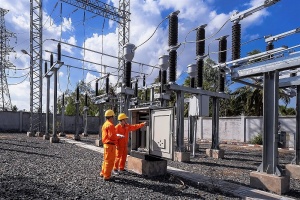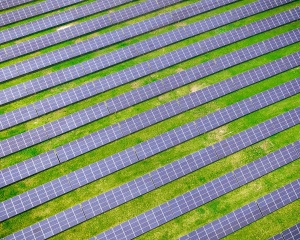Electric generation hikes to be dealt with
At a seminar on the electricity cost situation organised by the Vietnam Government Portal on October 10, deputy director of the Electricity Regulatory Authority of Vietnam (ERAV) Nguyen The Huu said that the Ministry of Industry and Trade (MoIT) is responsible for presiding over and coordinating with relevant units to inspect Vietnam Electricity’s (EVN) production and business costs based on financial reports audited by independent units.
 |
| Electric generation hikes to be dealt with |
Last week, the MoIT announced the results of the audit of such costs for 2023, in which EVN lost up to VND22 trillion ($885 million).
Huu cited that according to the report, last year the input fuel prices for electricity production - including coal, oil, gas, and foreign exchange rates - all increased due to fluctuations in the global socio-political situation, causing the structure of electricity sources to fluctuate in an unfavourable direction.
As a result, cheap electricity sources such as hydropower decreased, while expensive electricity sources such as coal and oil increased.
“Along with that, Vietnam’s electricity demand increased, by approximately 10-11 per cent, so in addition to cheap electricity sources that have been used up, we continue to use additional sources with higher prices. All of these factors lead to high electricity generation costs,” said Huu
Nguyen Tien Thoa, former director of the Price Management Department under the Ministry of Finance, said the calculation of electricity costs has not been completed. In addition, the distinction between electricity serving production and serving social goals is sometimes not clear, leading to distortions in prices.
“According to the published inspection data, the electricity cost is 2.088 VND/KWh and the average selling price is 1.953 VND/KWh. That means the electricity cost is almost 7 per cent higher than the average selling price,” said Thoa.
Phan Duc Hieu, standing member of the National Assembly’s Economic Committee, said that the electricity price being lower than the production cost and distribution cost is a shortcoming that affects the security and stability of the electricity supply.
“In practice, there have been times when the power supply is not stable, causing general damage to the economy, individuals, and businesses,” said Hieu. “In the long term, I recommend that we must separate producers, distributors, and consumers. We should coordinate policies on incentives to promote competition as well as cut administrative procedures and taxes so that we can reduce production and selling prices.”
Sharing the same view, Huu of the ERAV said the electricity price has not kept up with the cost of electricity production, causing the industry to lack resources for development. “We must find a way to make the electricity price closely follow the cost of electricity production,” Huu said.
Late last week, EVN increased the power retail price by 4.8 per cent, at 8.8 US cents per kWh, excluding VAT. According to EVN, the minimal rise will not impact social security or national development.
The MoIT in March proposed a mechanism for adjusting the average electricity price every three months, which it said would help the country more closely reflect the fluctuation in costs.
 | MoIT to adjust electricity prices to ensure cash flow for EVN The Ministry of Industry and Trade (MoIT) is looking to adjust the electricity retail prices to ensure cash flow for Vietnam Electricity Group (EVN). |
 | EVN proposes dynamic electricity pricing scheme According to Vietnamnet, Vietnam Electricity (EVN) submitted a formal document to the Ministry of Industry and Trade (MoIT) on August 21 with recommendations on a draft decision aimed at replacing Decision 24, which outlines the mechanism for adjusting the average retail electricity price. |
 | Electricity prices must reflect production costs for green transition Nguyen Xuan Thanh, a lecturer at the Fulbright School of Public Policy and Management in Vietnam, has suggested that for a successful green transition, Vietnam must accurately adjust electricity prices to mirror the costs of renewable energy production. |
What the stars mean:
★ Poor ★ ★ Promising ★★★ Good ★★★★ Very good ★★★★★ Exceptional
Related Contents
Latest News
More News
- Trung Nam-Sideros River consortium wins bid for LNG venture (January 30, 2026 | 11:16)
- Vietnam moves towards market-based fuel management with E10 rollout (January 30, 2026 | 11:10)
- Envision Energy, REE Group partner on 128MW wind projects (January 30, 2026 | 10:58)
- Vingroup consults on carbon credits for electric vehicle charging network (January 28, 2026 | 11:04)
- Bac Ai Pumped Storage Hydropower Plant to enter peak construction phase (January 27, 2026 | 08:00)
- ASEAN could scale up sustainable aviation fuel by 2050 (January 24, 2026 | 10:19)
- 64,000 hectares of sea allocated for offshore wind surveys (January 22, 2026 | 20:23)
- EVN secures financing for Quang Trach II LNG power plant (January 17, 2026 | 15:55)
- PC1 teams up with DENZAI on regional wind projects (January 16, 2026 | 21:18)
- Innovation and ESG practices drive green transition in the digital era (January 16, 2026 | 16:51)

 Tag:
Tag:
















 Mobile Version
Mobile Version